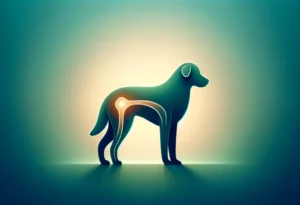Disclosure: We may earn a commission from helpful, relevant links in our content. No cost to you. See our privacy policy.
Rottweilers are magnificent companions, but their unique physiology makes them prone to joint issues, especially hip dysplasia. Understanding how early care can make all the difference in their lives is essential for any owner.
Early intervention is key in preventing joint complications in Rottweilers. Proper nutrition, exercise, and regular vet check-ups can help keep your pup’s hips healthy. There’s so much more to explore about early care that could prove vital to your dog’s well-being, so keep reading to unveil essential tips and insights.

Importance of Early Care
Starting your Rottweiler off on the right foot—or paw, in this case—is crucial for their overall health, especially when it comes to their hips. Early intervention can significantly reduce the risk of joint issues down the line, enabling them to lead a more active and fulfilling life. Just as we prioritize our health with regular check-ups, your pup needs the same dedication.
By scheduling early vet visits, you can identify hereditary conditions like hip dysplasia, which Rottweilers are unfortunately prone to. These visits can include X-rays and assessments that pinpoint potential problems before they escalate. The sooner you spot these issues, the better the chances are for effective management, which can also include weight management to reduce stress on the joints.
Routine exercise is another key factor in early care. While Rottweilers are naturally energetic, striking a balance between activity and rest is vital. Engaging in low-impact activities, especially during puppyhood, can help develop stronger muscles around their joints, harnessing their energy without adding undue stress. Think of it as laying down a solid foundation; your efforts in early care will set the tone for their later years.
Best Nutrition for Joint Health
Feeding your Rottweiler a balanced diet specifically tailored for joint health can work wonders. Prioritize high-quality proteins, such as chicken, beef, or fish, to assist in building strong muscles that support their joints. However, that’s just the start.
Look for foods rich in omega-3 fatty acids , typically found in fish oil. These healthy fats can help reduce inflammation and promote joint mobility. Remember, not all fats are bad—your furry friend actually needs the right kind to thrive!
Including joint-specific supplements can also make a significant difference. Here are some options to consider:
- Glucosamine and Chondroitin: These supplements help to maintain cartilage and alleviate joint discomfort.
- MSM (Methylsulfonylmethane): Known for its anti-inflammatory properties, it can enhance joint recovery.
- Turmeric: This natural anti-inflammatory can support joint health when combined with black pepper for better absorption.
Additionally, keep an eye on their weight. Obesity can lead to unnecessary strain on already vulnerable hips, making weight management essential. A mix of the right diet, proper exercise, and occasional joint supplements can provide your Rottweiler with the best chance of enjoying healthy joints well into their golden years.
Recommended Exercise Routines
Targeted exercises are key to keeping Rottweilers happy and healthy, especially when it comes to their hips. The focus should be on strengthening the muscles around the hip joints without putting too much strain on them. Here are a few routines to consider:
- Controlled walks : Short, gentle walks on flat surfaces promote muscle tone without overexerting your dog. Start with 10-15 minutes and gradually increase as your Rottweiler builds stamina.
- Low-impact swimming : Swimming is a fantastic way to strengthen hip muscles without the stress of impact on joints. Aim for sessions of about 15-20 minutes, watching for signs of fatigue.
- Short sprints : Engaging your Rottweiler in short bursts of play—like chasing a ball—can enhance their strength and agility. Keep these sessions brief to prevent overstraining.
- Hill climbing : Incorporate gentle inclines into walks. Ascending and descending hills provides great resistance training while keeping the exercise low-impact.
- Balance exercises : Using a stability ball or similar items encourages your Rottweiler to engage their core and hip muscles. Start with simple exercises, increasing complexity as they get comfortable.
Remember to always watch for any signs of discomfort during these activities; the goal is to strengthen and not to strain.
Regular Veterinary Check-ups
Routine vet visits are your best ally in maintaining your Rottweiler’s hip health.
Regular check-ups facilitate early detection of potential issues that can lead to significant joint problems down the line. It’s not just about vaccinations; during these visits, a veterinarian can:
- Conduct hip evaluations, looking for any signs of dysplasia or other potential issues.
- Assess weight management and provide guidance on maintaining your Rottweiler’s ideal weight—excess weight can exacerbate joint stress.
- Recommend nutritional advice tailored to support joint health, such as suggesting diets high in omega-3 fatty acids for their anti-inflammatory benefits.
Scheduling these check-ups at least once a year, or more frequently for older dogs, helps in identifying signs that might otherwise go unnoticed. Being proactive about healthcare pays off in the long run, ensuring your Rottweiler stays active and healthy.

Signs of Joint Problems in Rottweilers
Rottweilers can be stoic, but certain behavioral changes often signal joint issues lurking beneath the surface. Here are some common indicators to watch for:
- Difficulty Getting Up: If your Rottweiler struggles to rise after resting, it could point to hip discomfort.
- Reduced Activity: A noticeable drop in playfulness or reluctance to go for walks can indicate joint pain.
- Limping or Favoring a Leg: If your dog limps or puts less weight on one leg, the issue may stem from hip or joint problems.
- Decreased Flexibility: Struggling with movements like jumping or climbing stairs can be a red flag.
- Changes in Eating Habits: Elevated discomfort may lead to reduced appetite if your dog associates movement with pain.
Pay attention to these signals. Early detection can go a long way in managing joint health effectively.
Benefits of Weight Management
Carrying extra pounds puts unnecessary strain on your Rottweiler’s joints, particularly the hips. Keeping your pup at a healthy weight is crucial for joint longevity. Here’s how managing weight can protect those precious joints:
- Less Pressure: Every pound lost means less stress on the joints, which can slow down the progression of conditions like hip dysplasia and arthritis.
- Improved Mobility: With excess weight off their frame, Rottweilers often exhibit increased agility and flexibility, making playtime more enjoyable.
- Better Quality of Life: Maintaining a balanced diet and exercise fosters a happier, healthier dog who can enjoy life to its fullest.
To effectively manage your Rottweiler’s weight, focus on portion control, opt for high-quality dog food, and incorporate regular exercise into their routine.
Remember to consult your vet before making significant changes to their diet or exercise plan.
Additionally, consider using a scale at home or during vet visits to track your dog’s weight. Monitoring weight regularly can help catch any potential issues before they escalate, allowing for timely interventions.
Essential Home Care Tips
Creating a supportive environment for your Rottweiler significantly impacts their hip health. Start by ensuring they have comfortable bedding that’s orthopedic. This helps distribute their weight evenly and reduces strain on their joints during sleep. Choose a sleeping area away from drafts but with good ventilation.
Proper nutrition is another cornerstone. Opt for a high-quality diet that includes omega-3 fatty acids. These can help reduce inflammation and promote joint health. Supplementing with glucosamine or chondroitin may also be beneficial—just be sure to discuss this with your vet for the most appropriate dosage.
Keep your Rottweiler at a healthy weight. Obesity is a major contributor to joint issues, so monitor portion sizes and resist those puppy-dog eyes when they beg for treats. Regular, low-impact exercise is essential too. Going for walks or engaging in gentle play can maintain their muscle strength without over-stressing their joints.
Lastly, maximize your living space for easy movement. Remove any tripping hazards—like loose rugs or cluttered pathways—making it easier for your pup to get around without the risk of injury.
Innovative Treatments for Joint Issues
Rottweilers often face joint problems, especially as they age. Thankfully, there are some innovative treatments that can make a big difference in managing these issues.
One standout option is regenerative medicine, particularly Platelet-Rich Plasma (PRP) therapy. This involves drawing blood from the dog, processing it to concentrate the platelets, and then injecting that mixture directly into the affected joint. The platelets release growth factors that can help stimulate healing and reduce inflammation.
Stem cell therapy is another promising avenue. This technique utilizes stem cells, often harvested from the dog’s fat tissue, and injects them into the joints. These cells can potentially regenerate damaged tissue and improve overall joint health.
For more serious cases, surgical advancements like the TPLO (Tibial Plateau Leveling Osteotomy) procedure can be necessary. This surgery alters the way the knee joint works to stabilize it, showing great results for dogs with ACL injuries. With advancements in materials and techniques, recovery times and outcomes have markedly improved.
Don’t overlook physical therapy either! Many Rottweiler owners have found success with hydrotherapy, where dogs exercise in water to build strength without putting too much pressure on their joints. This kind of therapy can also include laser treatments, massage, and specialized exercises tailored to the dog’s specific needs.
Lastly, incorporating a nutritional supplement like glucosamine and chondroitin can provide supportive care. These supplements help maintain joint health and reduce inflammation, offering a proactive approach alongside other treatments.
Staying aware of these modern therapies can empower you to keep your Rottweiler’s hips healthy, maximizing their quality of life and mobility.
Alex, a passionate animal lover, has experience in training and understanding animal behavior. As a proud pet parent to two dogs and three cats, he founded AnimalReport.net to share insights from animal experts and expand his knowledge of the animal kingdom.




